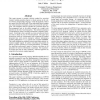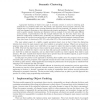18 search results - page 1 / 4 » Object Fault Handling for Persistent Programming Languages: ... |
OOPSLA
1993
Springer
13 years 9 months ago
1993
Springer
A key mechanism of a persistent programming language is its ability to detect and handle references to non-resident objects. Ideally, this mechanism should be hidden from the prog...
VLDB
1992
ACM
13 years 9 months ago
1992
ACM
This paper presents a portable, efficient method for accessing memory resident persistent objects in virtual memory in the context of the E programming language. Under the approac...
SOSP
1993
ACM
13 years 6 months ago
1993
ACM
Many operating systems allow user programs to specify the protectionlevel (inaccessible, read-only, read-write) of pages in their virtual memory address space, and to handle any p...
POS
1992
Springer
13 years 9 months ago
1992
Springer
Persistent programming systems are generally supported by an object store, a conceptually infinite object repository. Objects in such a repository cannot be directly accessed by u...
POS
1990
Springer
13 years 9 months ago
1990
Springer
Appropriate clustering of objects into pages in secondary memory is crucial to achieving good performance in a persistent object store. We present a new approach, termed semantic ...



